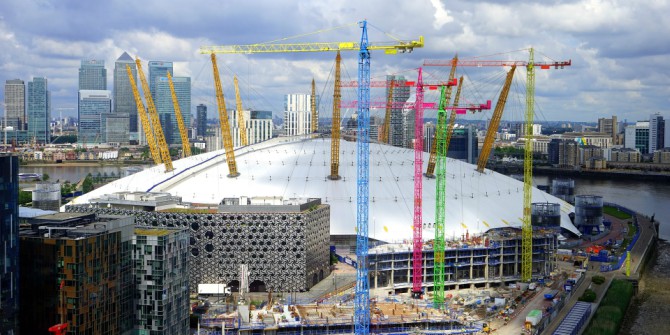
For all its political resonance, the British handover of Hong Kong to China in 1997 merely ratified a long-standing economic reality. Since the late 1970s, when the People’s Republic began its transformation to a market-based system, Hong Kong’s economy has been deeply intertwined with the mainland. As China’s manufacturing muscle powered the country into the front rank of the world economy, Hong Kong provided the financial fuel.
Yet while China has clearly benefited from this relationship, it is far less certain that Hong Kong has, writes Hong Kong-based SAGE Business Researcher freelance correspondent Suzanne Sataline in her new report, Hong Kong’s Economy. The city of 7.3 million had an economic growth rate late last year that was half of what it was in the 1980s. It has never replaced the manufacturing industries it lost to the mainland and has failed to diversify its trade-and-finance-based economy by exploiting the digital revolution, she writes.
The city’s dilemma was encapsulated by Simon Cartledge, the former editor-in-chief for Asia of the Economist Intelligence Unit, a research and consulting firm in London. “Hong Kong is stuck, with remarkably little change to show for the last two decades,” Cartledge wrote. “Despite living on the doorstep of the world’s most dynamic economy of the last two decades, and despite having played a role in that economy’s initial opening and development, Hong Kong has gone sideways.”
It is less a question of failure than one of stagnation. Hong Kong’s economy retains significant strengths, including its traditional role as a provider of financial services. Many indicators – wage growth, tourist arrivals, even the amount bet on horse racing – are in the green zone, according to the Hong Kong-based research firm Asianomics Group. “It’s always going to be the financial hub and the gateway. You’re never going to get rid of it,” said Stephen Innes, the head of trading for Asia Pacific with Oanda Corp., a foreign exchange firm.
Yet there is an unmistakable sense of a moment missed, a curtain falling. “It’s not a place that has failed, but it is one of lost opportunity, of diminished expectations and modest ambition,” Cartledge wrote.
By way of example, Sataline notes the relative decline of Hong Kong as a port. As recently as 2004, Hong Kong was the world’s busiest. It was surpassed by Singapore in 2005 and is now number five, while Shanghai has risen to the top. While Hong Kong’s total port tonnage rose a scant 11 per cent from 2001 to 2016, Shanghai’s increased fivefold during the same period.
Hong Kong’s government and its chief executive, Carrie Lam, have rolled out initiatives that seek to re-energise the city. But they must overcome a host of structural problems, including a tightly knit business elite that restricts competition and innovation, Sataline writes. Other problems include housing prices that have soared even higher than the city’s iconic Peak, growing income inequality and discontent over China’s increasingly tight political control.
In case there was any doubt about Beijing’s will, the Chinese government marked the 20th anniversary of the handover last July by sending a naval flotilla that included its first operational aircraft carrier, the Liaoning. President Xi Jinping paid a visit to the city shortly before the warships arrived and warned that opposing China would be “impermissible.”
Under the “one country, two systems” principle adopted at the handover, Chinese leaders have pledged to respect Hong Kong’s separate political and legal systems until at least 2047. But the deep economic interconnection makes Hong Kong vulnerable to the Chinese economic slowdown that began in 2015, Sataline writes.
“Hong Kong doesn’t really exist anymore as a separate state,” Andrew Clarke, director of trading at the Hong Kong brokerage firm Mirabaud Asia Ltd., told Business Researcher. “Hong Kong is part of China, whether you like it or not. It’s done.”
Notes:
- SAGE Business Researcher has been discontinued and the report this blog post is based on is no longer available as of 2019.
- The post gives the views of its authors, not the position of LSE Business Review or the London School of Economics.
- Featured image credit: Hong Kong street view, by ShenXin, under a CC0 licence
- When you leave a comment, you’re agreeing to our Comment Policy.
 Ken Fireman is managing editor for SAGE Business Researcher, which delivers deep dives on contemporary business issues to students and faculty three times a month. He was previously a senior editor for economics and politics at Bloomberg News and a White House correspondent, national political reporter and Moscow bureau chief for Newsday. @kfireman1
Ken Fireman is managing editor for SAGE Business Researcher, which delivers deep dives on contemporary business issues to students and faculty three times a month. He was previously a senior editor for economics and politics at Bloomberg News and a White House correspondent, national political reporter and Moscow bureau chief for Newsday. @kfireman1





